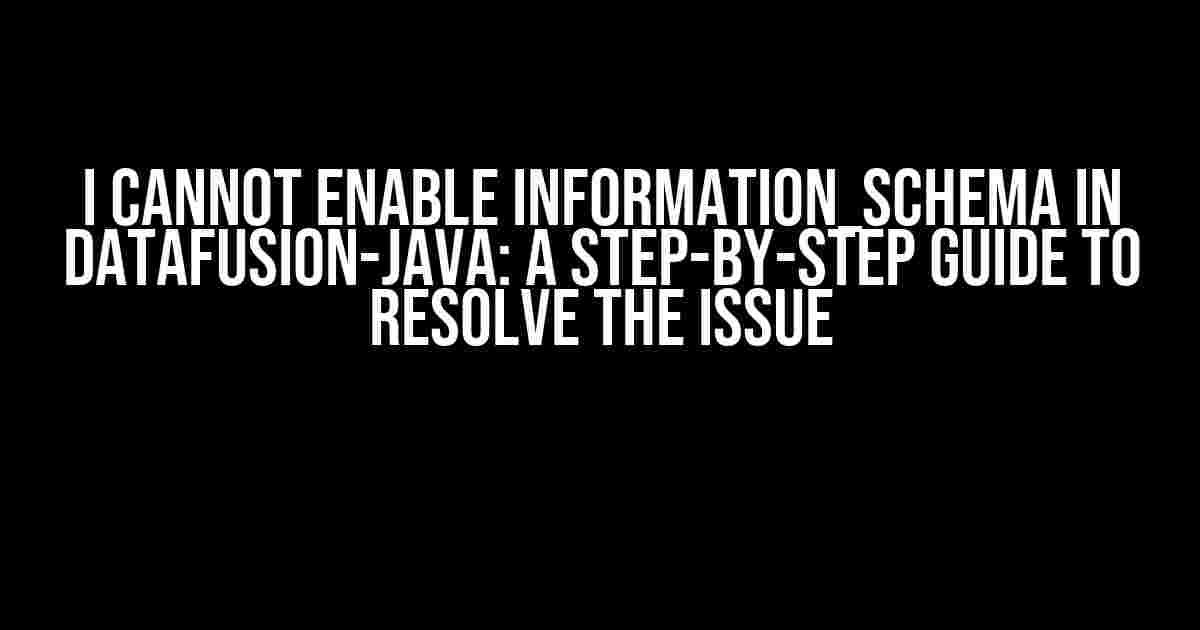Are you stuck with the frustrating error “I cannot enable information_schema in DataFusion-Java”? You’re not alone! Many developers have faced this issue, and it’s time to put an end to it. In this comprehensive guide, we’ll take you through the causes, troubleshooting steps, and solutions to get information_schema up and running in DataFusion-Java.
What is Information_Schema?
Before diving into the solution, let’s quickly understand what information_schema is and why it’s essential in DataFusion-Java. Information_schema is a built-in database in SQL that provides metadata about the database, its schema, and its objects. It’s a read-only database that contains information about tables, views, columns, data types, and more.
Why Do I Need Information_Schema?
In DataFusion-Java, information_schema plays a vital role in query optimization, data analysis, and data visualization. It helps developers:
- Understand database schema and relationships
- Optimize queries for better performance
- Identify data quality issues and inconsistencies
- Create data visualizations and reports
- Simplify data integration and ETL processes
Troubleshooting Steps
Now that you know the importance of information_schema, let’s get to the troubleshooting steps to resolve the issue:
Step 1: Check DataFusion-Java Configuration
Verify that you have correctly configured DataFusion-Java by checking the following:
- Make sure you have included the DataFusion-Java dependency in your project’s pom.xml file (if using Maven) or build.gradle file (if using Gradle).
- Check that you have initialized the DataFusion-Java engine correctly, including the JDBC connection and database credentials.
Here’s an example of a correct DataFusion-Java configuration:
<dependency> <groupId>com.linkedin.datafusion</groupId> <artifactId>datafusion-java</artifactId> <version>2.3.0</version> </dependency>
Step 2: Verify Database Permissions
Ensure that the database user has the necessary permissions to access information_schema. You can check this by:
- Logging into the database using the same credentials used in DataFusion-Java
- Running a query to verify access to information_schema, such as:
SELECT * FROM information_schema.tables;
If you encounter permission issues, you may need to grant additional privileges to the database user.
Step 3: Check JDBC Driver Compatibility
Verify that the JDBC driver used by DataFusion-Java is compatible with the database and supports information_schema. You can check the JDBC driver documentation or vendor website for compatibility information.
Step 4: Disable Database Firewall Rules
Solutions to Enable Information_Schema
After troubleshooting, if you still can’t enable information_schema, try the following solutions:
Solution 1: Use a Different JDBC Driver
Try using a different JDBC driver that supports information_schema. For example, if you’re using a MySQL database, switch to the MySQL Connector/J JDBC driver:
<dependency> <groupId>mysql</groupId> <artifactId>mysql-connector-java</artifactId> <version>8.0.23</version> </dependency>
Solution 2: Use a Custom SQL Query
If the JDBC driver doesn’t support information_schema, you can use a custom SQL query to retrieve the necessary metadata. For example:
SELECT
t.table_name,
c.column_name,
c.data_type
FROM
information_schema.tables t
JOIN information_schema.columns c
ON t.table_name = c.table_name
WHERE
t.table_schema = 'your_database_schema';
Solution 3: Use a Third-Party Library
Consider using a third-party library that provides information_schema-like functionality, such as Apache Calcite or jOOQ.
Best Practices for Working with Information_Schema
To ensure smooth integration with information_schema in DataFusion-Java, follow these best practices:
- Regularly update your JDBC driver to ensure compatibility with the latest database versions.
- Use a consistent database schema and naming conventions to simplify metadata retrieval.
- Optimize your queries to reduce the load on the database and improve performance.
- Use caching mechanisms to store frequently accessed metadata to reduce the number of queries.
- Monitor database performance and adjust your queries accordingly to prevent bottlenecks.
Conclusion
You’ve made it! With these troubleshooting steps and solutions, you should be able to enable information_schema in DataFusion-Java. Remember to follow best practices to ensure a seamless integration and optimize your queries for better performance.
| Troubleshooting Step | Possible Solution |
|---|---|
| Check DataFusion-Java Configuration | Verify dependency inclusion and engine initialization |
| Verify Database Permissions | Grant necessary privileges to the database user |
| Check JDBC Driver Compatibility | Use a compatible JDBC driver or switch to a different one |
| Disable Database Firewall Rules | Temporary disable firewall rules or restrictions |
| Use a Different JDBC Driver | Switch to a JDBC driver that supports information_schema |
| Use a Custom SQL Query | Retrieve metadata using a custom SQL query |
| Use a Third-Party Library | Use a library that provides information_schema-like functionality |
By following this guide, you’ll be well on your way to resolving the “I cannot enable information_schema in DataFusion-Java” issue and unlocking the power of metadata in your data integration and ETL processes.
Frequently Asked Question
Having trouble enabling information_schema in DataFusion-Java? Don’t worry, we’ve got you covered!
Q: What is the minimum version of DataFusion required to enable information_schema?
A: You need to be running DataFusion version 3.4 or later to enable information_schema. Make sure you’re running the latest version to take advantage of this feature!
Q: How do I enable information_schema in DataFusion-Java?
A: To enable information_schema, simply add the `information_schema` catalog to your DataFusion configuration. You can do this by creating a new `Catalog` instance and adding it to your `SqlParser` or `DataContext` instance.
Q: Why is information_schema not enabled by default in DataFusion-Java?
A: Information_schema is not enabled by default because it can introduce performance overhead and security risks if not properly configured. By requiring explicit configuration, we ensure that users are aware of the implications and can take necessary precautions.
Q: Can I enable information_schema programmatically in DataFusion-Java?
A: Yes! You can enable information_schema programmatically by using the `DataContext` API to add the `information_schema` catalog to your DataFusion instance.
Q: What are the benefits of enabling information_schema in DataFusion-Java?
A: Enabling information_schema provides valuable metadata about your database, including table and column information, which can be used for optimization, auditing, and compliance purposes. It’s a powerful tool to have in your data management arsenal!


